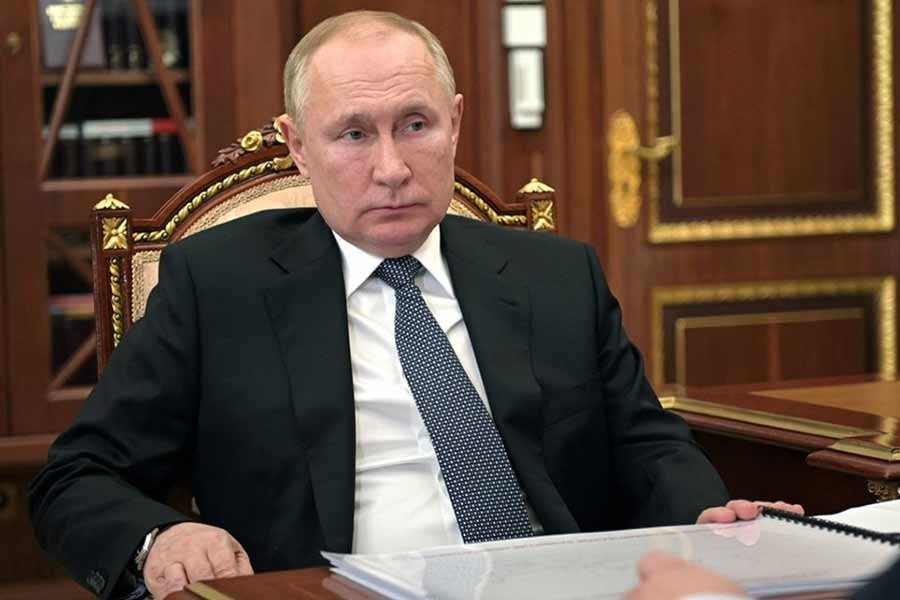The war in Ukraine has to all appearances taken a dangerous turn. And that is not because Russia has made substantial gains in its war with Ukraine. Quite contrary to this, its losses have been huge on the battle fronts in Ukraine. Which is why, the country's president, Vladmir Putin, has announced a 'partial mobilisation' of reservists.
But such orders for mobilisation are issued in times of a national emergency. Is Russia facing any emergency?
If the Ukrainian forces have recovered a large swathe of their own territory lost to the Russian forces at the beginning of the latter's invasion of that country (Ukraine), that cannot be an issue of national emergency. For such defeats of an invading army at the hands of the forces of resistance defending the country thus attacked is nothing new in history. It happened when Russia, or the then-Soviet Union, to be specific, had suffered defeat in Afghanistan, a country it invaded at the end of 1979.
In fact, most imperialist powers faced similar defeats in their wars with far weaker adversaries both during the post-colonial period and before that. And those were not looked upon as a national emergency by the imperialist nations in question. Rather in many cases in the face of such military setbacks, the invaders reached deals with the forces of resistance. America did so before leaving Vietnam through a peace deal in 1973.
Considering the callup of reservists, it is apparent that the present leadership of Russia is looking at its military debacle in Ukraine from a different perspective.
Also consider that president Putin even warned Nato countries that it might use its nuclear weapons to counter what he termed 'nuclear blackmail' by the West.
However, the Western powers have, as usual, dismissed Putin's threats as bluff.
Maybe, it is a bluff. But given his (Putin's) previous records of not accepting any defeat, it raises serious questions about the Western leaders' wisdom of responding to his every threat, fake or otherwise, with derision.
True, Russia is not performing well with its conventional weaponry, a fact the West always knew and has never stopped from saying it to be so. But does that also imply that Russia's nuclear weapons are equally inefficient or imprecise?
Even if it is so, does it then imply that a nuclear war with Russia armed with its 'imprecise' nukes is winnable?
Such a reasoning is deeply flawed and it is not that the Western powers are not aware of it.
To be frank, nuclear threats, albeit those are bluffs -- but who knows they are? -- are existential ones. There is no room for taking chances. For in most wars when threats are issued by one party, the opponent party call the other's bluff. It is part of the game in any war. But still wars break out.
Upset at reverses in Ukraine, Putin's Russia has gone so far as to order a partial mobilisation.
Though it may not be appealing to many Russians, who are learnt to have been rushing to the nearest airports to catch the first flight out of the country, it may not be so to others. In that case, as told by Russian defence minister, Sergei Shoigu, the calling of 300,000 reservists is not going to be a big deal.
In a similar vein, holding of referendums this week in the Russian controlled regions of eastern and southern Ukraine by the governments installed there by Putin is clearly a move to integrate those with the Russian mainland.
This points to the fact that Putin, despite his army's setbacks in Ukraine, has not shifted an inch from his previous stand that Ukraine is part of Russia and that it was lost in the wake of the Soviet Union's disintegration in the early 1990s due to the West's instigation.
And with their huge nuclear arsenal, many Russians still love to remember that they were once a great power and Putin is the man who can restore that past glory.
For one may recall at this point how Russians welcomed with applause the annexation of Crimea with Russia in a similar process.
So, the dominant Western view that Putin is unpopular and that the general Russians suffering from the Western-imposed sanctions are deeply annoyed with him may not be a foolproof one.
And one cannot say with certainty that the common Russians will rise up against Putin's misrule as well as his foolhardy campaign in Ukraine.
Such Western assumptions about the Russian psyche are often mistaken.
And there are ample instances in favour of this argument if one revisits the history of its past wars, especially, the Second World War when Russians fought the far superior Hitler's army, made great sacrifices and in the end vanquished the invaders.
So, it may also be that many Russians at the moment are cursing the Western sanctions for their present miseries.
And Putin may exploit this public sentiment to unite the nation to push through his agenda of turning his 'special military operation' in Ukraine into a war of national self-defence against outside powers who again want to see the end of Russia and not of Putin.
Thus emboldened, Putin may even think of making good on his nuclear warnings to the West!


